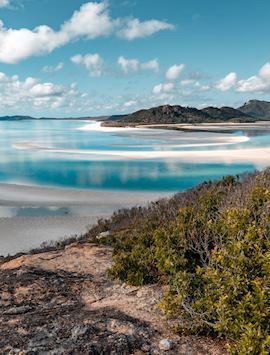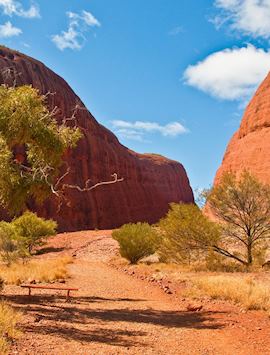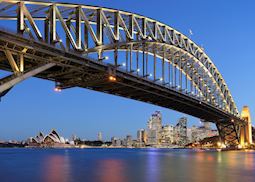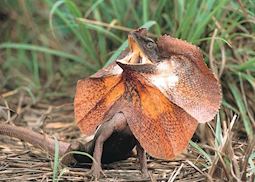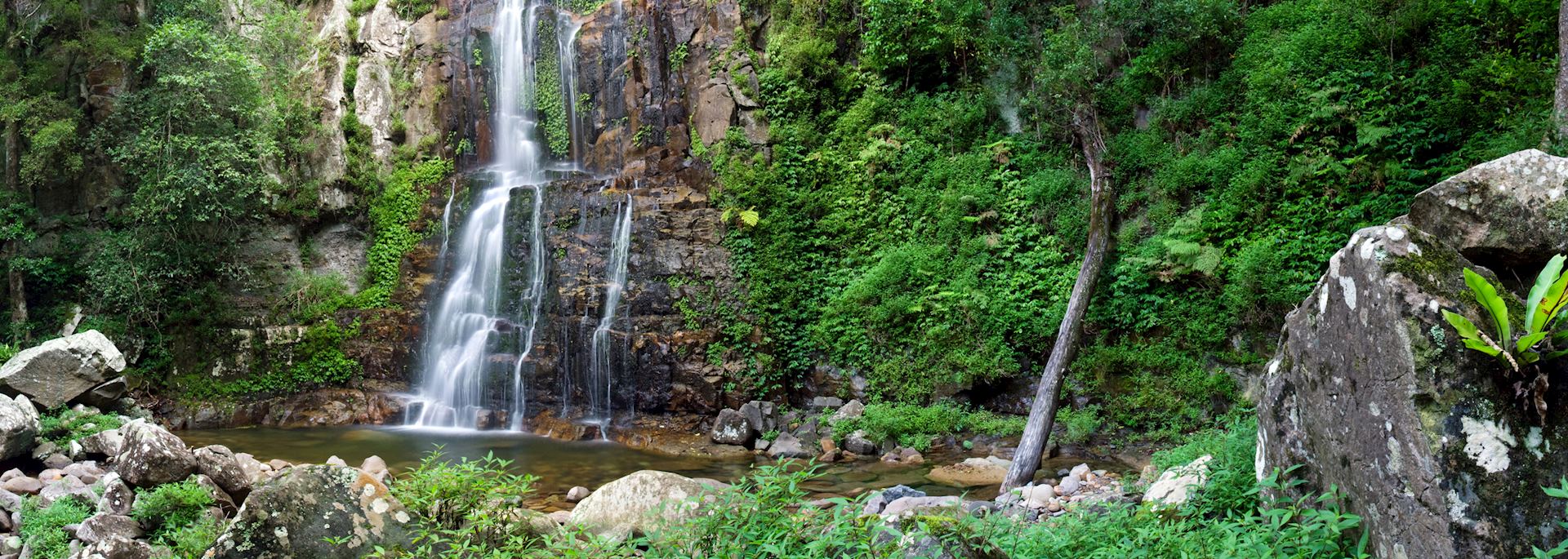
When is the best time to visit Australia?
The best time to visit Australia depends on the area you plan to see. A country of two climates, Australia鈥檚 northern half is driest and most accessible between April and September. Warm, sunny days show the national parks and beaches at their very best, providing opportunities for swimming and barbecues. The north is humid from October to March, with more rainfall, but this is offset by the active wildlife, and reinvigorated rainforests and wetlands.
In the southern half of Australia, the summer months (December to February) bring hot weather. Autumn (March to May) is also a lovely time, with numerous festivals and the busy grape harvest. Winter (June to August) is less busy and generally attracts a temperate climate that鈥檚 ideal for hiking, while spring (September to November) often sees more wildlife activity.
Month-by-month guide for travelling in Australia
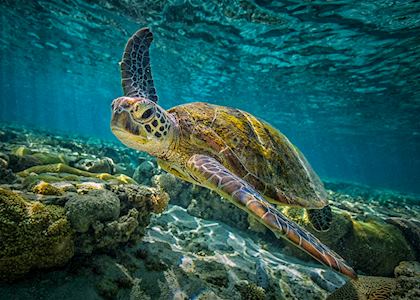
Visiting Australia in January - March
Hot and humid conditions and storms bringing tropical rain bursts typify the start of the year in northern Australia. During these months northern Australia experiences its wet season, and can be difficult to get to.
In the south, the days are warm and sunny, and while there can be heavy rain showers, these pass quickly. This is the most popular period for Australians to take time off work, with Australia Day celebrated in January, frequent sports events and numerous festivals.
It can be busy across the southern part of the country and on its beaches. The Great Barrier Reef can be visited, but its weather is temperamental around this period. Ningaloo Reef can also be visited, but please be aware that it has extremely hot weather around this time.
Events & Festivals
- In late January take in the firework displays and lively celebrations around Sydney Harbour, which mark Australia Day.
- Take your seat at one of the many outdoor cinema screenings held throughout the summer.
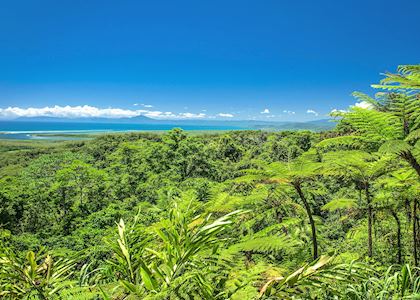
Visiting Australia in April - May
In the north, the temperatures are pleasant and the crowds of summer have started to disperse. Roads open up across the region, improving access to more remote locations.
With plenty of sunshine and much less rain than the summer months, April is one of our most recommended times to visit the south. In May, the south is still bright and sunny, but the temperatures begin to drop a little, triggering a notable change in the landscape as autumn hues appear.
Events & Festivals
- Between April and June take a boat trip out to see or even swim with the whale sharks near the Ningaloo Reef.
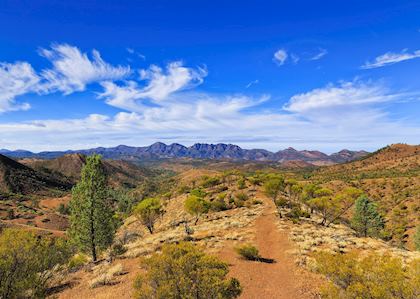
Visiting Australia in June - September
Northern Australia’s 'dry season' (during the Australian winter) is a time of lovely sunny days and warm temperatures, well suited for exploring on land or underwater. The tidal currents around the Great Barrier Reef are gentler, creating good snorkelling conditions.
In the country’s southern regions the weather is more temperate, making for good hiking conditions, although it can be rainy in certain parts. This period is a quieter season in the south, and the comfortable temperatures make it an excellent time to explore some of the rural inland regions, such as the Flinders Ranges, that are best avoided during the very hot summer.
Events & Festivals
- Take in the unusual Henley-on-Todd Regatta, held on the dry riverbed in August in Alice Springs.
- Between April and June take a boat trip out to see or even swim with the whale sharks near the Ningaloo Reef.
- The Brisbane Festival takes place for three weeks in September with a line-up of music, comedy and theatrical events. Combine this with a wider exploration of Brisbane.
- A vibrant mix of wildflowers dot the landscape in Western Australia in September.
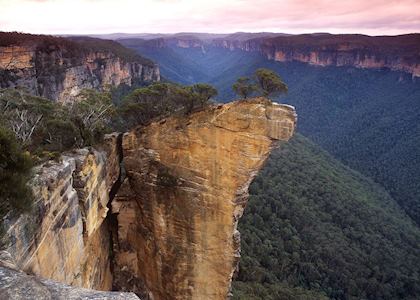
Visiting Australia in October - December
In the north, the temperature and humidity starts to build, causing the odd thunderstorm. This can bring welcome rain, transforming Outback landscapes with wildflowers. Along the coast, high winds can affect access to the reef islands.
In the south, this is the start of spring. Terrific walking and wildlife-spotting opportunities open up in the national parks and coastal regions. As Christmas approaches, Christmas lights and trees appear in towns and cities under blue skies. The year culminates in New Year's Eve celebrations with dazzling firework displays.
Events & Festivals
- Hike along one of the well-marked trails in October before the summer crowds arrive in the Blue Mountains.
- Explore in November and take in the food and wine festivals in and around the region of the Margaret River.
- Dress up for the 'race that stops the nation' as Australians tune in for the Melbourne Cup horse race in early November.
- Take your seat at one of the many outdoor cinema screenings held throughout the summer.
Australia Climate Guide
| Destination | Jan | Feb | Mar | Apr | May | Jun | Jul | Aug | Sep | Oct | Nov | Dec |
|---|---|---|---|---|---|---|---|---|---|---|---|---|
| Adelaide | 28°C 19mm | 29°C 15mm | 26°C 25mm | 22°C 44mm | 19°C 67mm | 16°C 70mm | 15°C 77mm | 16°C 66mm | 18°C 56mm | 21°C 44mm | 24°C 31mm | 26°C 27mm |
| Brisbane | 30°C 160mm | 29°C 167mm | 28°C 135mm | 27°C 91mm | 24°C 83mm | 21°C 68mm | 21°C 63mm | 22°C 41mm | 24°C 34mm | 26°C 89mm | 28°C 104mm | 29°C 128mm |
| Cairns | 32°C 472mm | 31°C 491mm | 31°C 484mm | 29°C 265mm | 28°C 136mm | 26°C 69mm | 25°C 42mm | 26°C 38mm | 28°C 46mm | 30°C 50mm | 31°C 117mm | 32°C 211mm |
| Darwin | 32°C 365mm | 32°C 335mm | 32°C 299mm | 33°C 76mm | 33°C 20mm | 31°C 2mm | 31°C 1mm | 32°C 3mm | 34°C 15mm | 35°C 65mm | 34°C 117mm | 33°C 245mm |
| Hobart | 22°C 43mm | 22°C 43mm | 20°C 45mm | 17°C 51mm | 15°C 51mm | 12°C 46mm | 12°C 57mm | 13°C 59mm | 15°C 51mm | 17°C 60mm | 19°C 57mm | 20°C 59mm |
| Kakadu National Park | 33°C 324mm | 33°C 314mm | 33°C 293mm | 34°C 69mm | 33°C 12mm | 32°C 1mm | 31°C 2mm | 33°C 2mm | 36°C 9mm | 37°C 36mm | 37°C 141mm | 35°C 217mm |
| Kangaroo Island | 23°C 17mm | 23°C 21mm | 21°C 28mm | 19°C 50mm | 17°C 80mm | 15°C 94mm | 14°C 107mm | 14°C 90mm | 15°C 65mm | 18°C 48mm | 20°C 29mm | 21°C 24mm |
| Melbourne | 26°C 46mm | 26°C 45mm | 24°C 45mm | 20°C 56mm | 17°C 70mm | 14°C 48mm | 14°C 54mm | 15°C 61mm | 17°C 64mm | 20°C 73mm | 22°C 64mm | 24°C 61mm |
| Perth | 31°C 8mm | 31°C 15mm | 29°C 15mm | 25°C 44mm | 22°C 110mm | 19°C 174mm | 18°C 169mm | 18°C 114mm | 20°C 71mm | 22°C 50mm | 25°C 23mm | 28°C 10mm |
| Port Douglas | 31°C 437mm | 31°C 427mm | 31°C 427mm | 30°C 206mm | 28°C 79mm | 27°C 44mm | 26°C 26mm | 27°C 26mm | 29°C 33mm | 30°C 40mm | 31°C 113mm | 32°C 182mm |
| Sydney | 26°C 127mm | 26°C 146mm | 25°C 154mm | 23°C 113mm | 20°C 111mm | 17°C 150mm | 17°C 75mm | 18°C 93mm | 20°C 61mm | 23°C 92mm | 24°C 102mm | 26°C 84mm |
| The Whitsunday Islands | 31°C 325mm | 31°C 323mm | 30°C 232mm | 28°C 147mm | 26°C 107mm | 24°C 47mm | 24°C 27mm | 25°C 20mm | 27°C 19mm | 29°C 24mm | 30°C 83mm | 31°C 146mm |
| Uluru-Kata Tjuta National Park | 37°C 44mm | 36°C 45mm | 33°C 45mm | 29°C 25mm | 23°C 23mm | 20°C 20mm | 20°C 9mm | 22°C 13mm | 27°C 18mm | 31°C 24mm | 34°C 34mm | 36°C 21mm |
Why travel with Audley?
- 100% tailor-made tours
- Fully protected travel
- Established for over 25 years
- 98% of our clients would recommend us
Travel advice
Practical tips for travelling to Australia, from social protocols to guidance on money matters, with a link to the latest FCDO travel advice.

Request our brochure
Covering all seven continents, The World Your Way shows you how you can see the world with us. It features trip ideas from our specialists alongside hand-picked stays and experiences, and introduces our approach to creating meaningful travel experiences.
Trip ideas and travel guides for exploring Australia
-
![Whitehaven Beach in the Whitsunday Islands]()
-
![Kata Tjuta, Northern Territory]()
-
What to do in Australia: our highlights guide ![Sydney Harbour Bridge]()
What to do in Australia: our highlights guide
What to do in Australia: our highlights guide
Read this guide -
Australia's top 10 nature experiences ![Frilled Neck Lizard, Kakadu National Park]()
Australia's top 10 nature experiences
Australia's top 10 nature experiences
Read this guide



